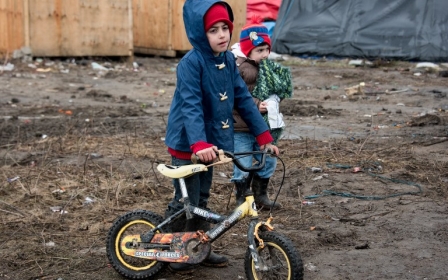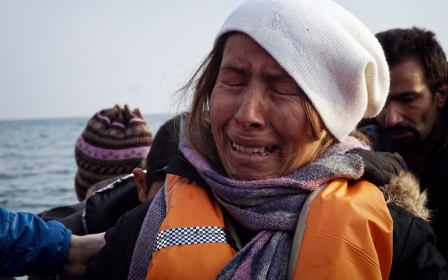In packed Lesbos camp, desperation rising among refugees

LESBOS, Greece – Crouched at the back corner of the Moria refugee detention centre, whispering through the gaps in the chain link fence, 31-year-old Muhammad Al-Rifie from Deraa, Syria, describes the desperate situation inside the camp.
“The buildings are full so my family sleep outside on the ground,” he said. “It is very cold at night. And the food we get is very bad, it is not enough even for me, how can it be enough for all my family?”
Muhammad arrived with his wife and three toddlers on the Greek island of Lesbos on Sunday. Like all those who have succeeded in crossing the narrow but treacherous strait between Turkey and Greece since the signing of the EU’s new deal with Ankara, they have been detained inside the camp.
In recent weeks, as the camp was converted from a refugee reception centre into a detention centre, access has been severely curtailed. Hellenic Police officers running the site have been ordered to prevent anyone from taking photographs of the site or talking to refugees.
As MEE attempted to speak to a refugee from Pakistan about what he thought would happen to him as deportations started, a police officer who declined to be named said asking questions “will cause problems” and ushered MEE away.
Muhammad, like many others from Syria, fled the violence that has laid waste to his country over the past five years. In Syria, he had a successful life as a businessman, taking regular work trips to China and even learning Mandarin. He spent $10,000 dollars to get his family to safety, $3,000 of which was spent paying smugglers to ferry them to Lesbos.
Now, in his current situation, he wonders if it was worth it.
“We left Syria because of the war, because of Bashar Al-Assad. Life in Syria was horrible, but here in this camp how is it different?” he said.
Described as a one-in-one out policy, the EU’s new deal with Turkey will see all irregular migrants arriving on Greek shores detained and registered, and returned to Turkey. In their place, Syrian refugees from Turkish camps will be relocated to Europe.
Under the deal, all people who arrived on or after 20 March are entitled to claim asylum and have their case heard individually. Those who do not claim asylum or those whose claims are rejected will be immediately returned to Turkey.
In Turkey, Syrians will stay in camps while it is thought that non-Syrians will be returned to their country of origin.
In recent days, tensions at the camp have been building with fights breaking out between refugees. A lack of food is often the source of confrontations, said Muhammad.
“People are fighting a lot here,” he said. “It is a big problem. People are angry and scared, they are upset, they don’t know what to do.”
MEE has been passed a video from inside the camp, apparently filmed on Saturday, which shows refugees fighting during the distribution of food. Refugees can be seen throwing punches and kicks at each other whilst others attempt to hold them apart.
‘Unfair and inhumane’
Forty-five-year-old father of five, Zeyad al-Masri, also from Deraa, decided to make the journey to Europe after he was denied entry into Jordan – where his wife and children are staying in a refugee camp - five times.
Believing that he could find safety once claiming asylum in Europe and then send for his family to join him, Zeyad crossed from southern Syria into Turkey and then made the dangerous journey to Lesbos. He hasn’t seen his family in over a year.
Now held in the detention centre on Lesbos, he has been issued with a number in the asylum queue as he waits for his opportunity to make his case for why he should be allowed to make a home in Europe. He is number 8,072.
“I didn’t know about this place [Moria camp] when I left Turkey,” he said. “I didn’t know I was going to be arrested. If I had known I wouldn’t have come.”
Early on Monday morning, the first of those to be deported under the new deal were ferried from the Greek port of Mytilene, to the town of Dikili, Turkey. The majority of the 136 in the first trips were from Pakistan and all were people who had not requested asylum.
The returns, which some EU leaders say will break the smuggler business model, are designed to bring irregular migration into Europe to a halt.
But by the end of the day, at least 228 new people arrived on the Greek islands according to UN High Commissioner for Refugees figures, while 202 were returned to Turkey from Lesbos and Chios, a net EU increase.
The deal has been heavily criticised by NGOs, with the UNHCR claiming that collective deportations are illegal. Questions remain over whether Turkey is a safe destination to return refugees, with Amnesty International releasing a report last week alleging that Turkey has been illegally returning Syrian refugees, a claim Turkey has denied.
Since the implementation of the deal the UNHCR, Doctors Without Borders, International Rescues Committee and Norwegian Refugee Council have all suspended their operations in the Moria camp.
"We made the extremely difficult decision to end our activities in Moria because continuing to work inside would make us complicit in a system we consider to be both unfair and inhumane," said Marie Elisabeth Ingres, MSF head of mission in Greece.
Back inside the Moria camp, for Muhammad the prospect of returning to Turkey worries him.
“Turkey is a very bad place for refugees,” he said. “Syrians can’t work there and if the police see you they arrest you. They take your name and fingerprints and keep you for two days and then let you go. This happened to me ten times.”
Recently, refugees in the Vial detention centre on Chios broke down a fence and fled the camp. Three refugees were reportedly stabbed in the commotion. Muhammad worries something similar could happen here.
“The police told us ‘Ok, things will be better soon’ but now that time is up and people are angry. People are saying they will break down the fence and leave together.”
Muhammad is abruptly cut short as two Greek police officers appear. “No journalists allowed here, leave now!” they shout.
Stay informed with MEE's newsletters
Sign up to get the latest alerts, insights and analysis, starting with Turkey Unpacked
Middle East Eye delivers independent and unrivalled coverage and analysis of the Middle East, North Africa and beyond. To learn more about republishing this content and the associated fees, please fill out this form. More about MEE can be found here.




